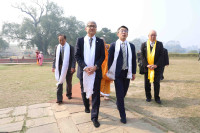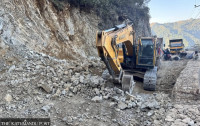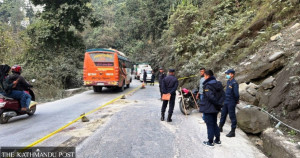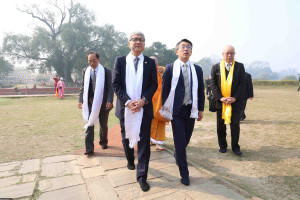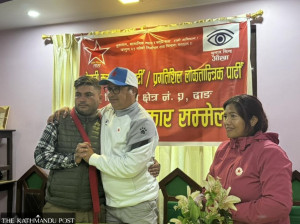Lumbini Province
Travellers trapped by nationwide transport strike
Many migrant workers returning home from India were stranded on the route amid hunger and heat and, with no help in sight.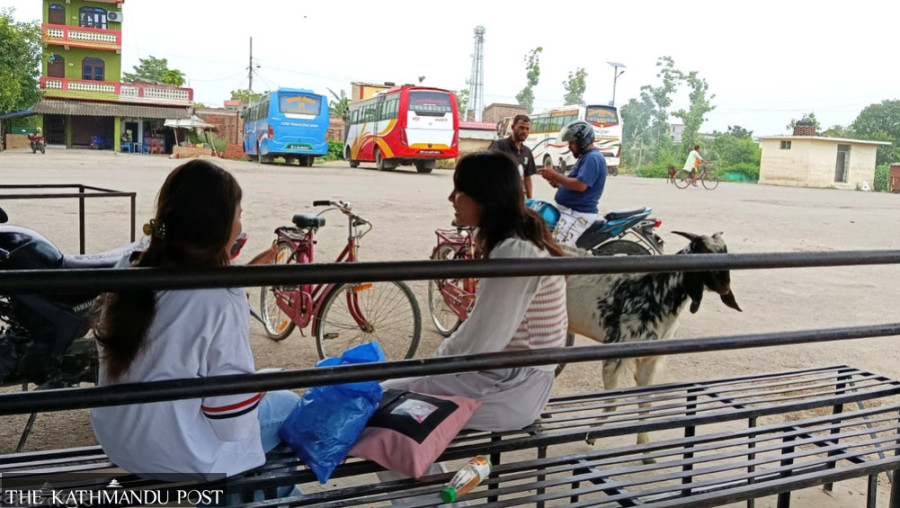
Sanju Paudel
After a trip to India, Narad Prasad Bhusal of Parbat district returned to Nepal through the Sunauli border point on Monday night. Planning to head home the next morning, he reached the Butwal bus park early Tuesday, only to find no buses operating.
Unaware of the ongoing transport strike, he was left stranded the entire day. “Had I known about this, I wouldn’t have left my relatives’ place in Butwal,” he lamented. “Now I’m just stuck. I don’t know what to do.”
His story is just a case in point. Hundreds of passengers were left in limbo across the country on Tuesday, the second consecutive day of the transport strike.
A group of seven labourers carrying pots, clothes and other belongings in sacks was also camped out at the bus park, hoping to reach Biratnagar. Among them was Basanta Rishidev, a construction worker whose team had recently completed work on a bridge in Suryapura, Rupandehi. Their contractor had brought them to Rupandehi for the work and had already left home, promising to pay them upon arrival.
“We don’t even have money for food. We slept here last night, and the last thing we ate was chowmein Monday evening,” Basanta said. “We have utensils, but not a rupee to buy groceries. The contractor said he would pay our fare at home, so we’re just stuck.”
While transport entrepreneurs have halted services to press their demands with the government, little attention has been paid to the hardship faced by the commoners.
Vehicular movement came to a grinding halt in Rupandehi on Monday and Tuesday. Passengers waited at the bus park in the hope that services would resume, with some even considering chartering vehicles. But uncertainty, fear of penalties and pressure from transport associations kept even small vehicles, jeeps, and tipper trucks from carrying passengers.
Usually buzzing with activity, Butwal has become eerily quiet due to the transport halt. Shops have seen a dramatic drop in customers, and fruit and vegetable vendors sit idle as footfall dwindles.
Padam Bahadur Bhat, who came to Butwal from Arghakhanchi three days ago ahead of his flight to Japan, said his funds are running low. Having previously worked in Bahrain and Saudi Arabia, this was his next overseas venture. But delays in reaching Kathmandu could cost him his visa.
“The small vehicles charge exorbitant fares, and public transport operators are threatening anyone who operates vehicles in defiance of their strike,” said Bhat. “The government doesn’t provide employment and now it’s also making it harder to leave the country to find work.”
Many stranded people at Butwal bus park complained that they were now out of money—spent on food and accommodation—and had no idea how they would reach their destinations. Among them was Atul Soni from Gorakhpur, India, who paid Rs800 for an e-rickshaw from Sunauli to Butwal. His family had planned a visit to Kathmandu.
“Nobody told us buses weren’t running. We have two children with us, and now we’re stuck in the heat. This was supposed to be a vacation, but it turned into a nightmare," said Soni.
Many migrant workers returning home from India have been stranded at the bus park area in Butwal. Tilak Pun from Pyuthan was heading home to enrol his son in school. “I found out about the transport strike only after reaching here,” he said. “We’ve already been here two days," he lamented.
Like many others, Pun said their money had run out. “Nowadays, we transfer money home in advance, so we don’t carry much cash while travelling,” he said. “One friend waiting to go to Pokhara had to call home for Rs6,000 just to stay in a hotel while waiting for the buses to run.”
Passengers complain that the scorching heat and uncertainty are making the wait unbearable but there seems to be no one paying attention to their suffering.
In Dhangadhi, hundreds of passengers have been left stranded, unable to reach their destinations. The worst affected are those travelling to the remote hill districts of Sudurpaschim province.
Chakra Bahadur Khadka and his group of five have been waiting in Dhangadhi since Monday to return to their home in Bogtan of Doti district. Having travelled from Rajasthan, India, they now fear they will miss the all-important kulpooja (clan deity worship) because of the transport shutdown.
Ram Prasad Chaudhary and his nine friends returning from Ratnagiri, India, have been stuck in the Dhangadhi bus park since Monday, unable to find a way to reach Tikapur. “Even a jeep ride costs Rs1,000 now, while a regular bus ticket was only Rs300,” Chaudhary said.
Hundreds of others bound for districts like Achham, Bajhang, Dadeldhura, Doti, Baitadi, Darchula, and Bajura are in a similar plight. With bus counters closed and money running out, many travelers are now struggling.
Deputy Superintendent of Police Tek Jora of the Provincial Traffic Office confirmed that public transport across the Sudurpaschim region remains at a complete standstill due to the strike.
Similarly, at the usually busy Gulariya bus park in Bardiya, two young women from ward 12 of Dhangadhi Sub-Metropolitan City in Kailali were seen waiting for a vehicle on Tuesday morning. The duo had returned from a family visit to their sister’s home in Katarnia village, India.
Unaware of the ongoing transport shutdown, they had begun their return journey as usual, only to find the Gulariya bus park eerily deserted. "We didn’t know about the strike. We left our sister’s house early and only realised something was wrong after reaching the empty bus park," said Anjali Chaudhary.
Her friend Simata Raji, shared that they hadn’t eaten since morning and had been waiting for hours. "We’ve called family members in Dhangadhi to come get us by motorcycle, but we don’t know how long it will take," she said, visibly exhausted from the wait.
(With inputs from Arjun Shah in Dhangadhi and Ram Prasad Chauhan in Bardiya)




 18.12°C Kathmandu
18.12°C Kathmandu


